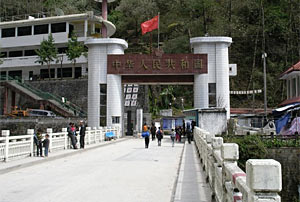
The “Friendship Bridge” at the Tibet-Nepal Border.
Twenty-five year old Tsering Wangchen, from Kyegudo (Chinese: Yushu) Tibetan Autonomous Prefecture, Qinghai province (in the Tibetan area of Kham), was handed over to Chinese officials and police on the Friendship Bridge, which marks the border between Nepal and Tibet, on July 16. According to an eyewitness source in Nepal: “Wangchen initially refused to get into the Immigration Department’s vehicle [to take him to the border] because he was afraid, knowing he was going to be deported to China. But he got into the vehicle when immigration officers told him that he would be sent to India.” Nepalese immigration officials had also reportedly assured staff of the Tibetan Refugee Reception Center in Kathmandu, which protects the welfare of Tibetans in transit to India, that he would be released into their care.
A letter from the Immigration Department of the Nepalese Home Ministry to the Tatopani immigration office in the Sindupalchok district of Nepal near the border, a copy of which has been obtained by ICT, states: “The decision has been reached that Mr Tsering Wangchen, an ethnic Tibetan, should be deported from Nepal and not allowed to enter Nepal for three years…he must be deported from the Tatopani border from Nepal on July 16, 2007.”
Although the Nepal government is not a signatory to international refugee conventions, the refoulement is a clear breach of the ‘Gentlemen’s Agreement’ between the Nepalese government and the United Nations High Commission for Refugees (UNHCR), which assumes cooperation among Nepalese police and government officials with the UNHCR in providing for the safe transit of Tibetan refugees through Nepal and onward to India. Since 1989, Tibetans entering Nepal have been allowed to stay only temporarily as ‘persons of concern’, and they are provided with shelter and food at the Tibetan Refugee Reception Center operated by the UNHCR in partnership, since October 2005, with the Lutheran World Federation.
Tsering Wangchen had initially arrived in Nepal in February 2006, and transited to India immediately, where he attended school. One of the most common reasons for the escape of young Tibetans into exile is to seek an education which is often unaffordable, or not available, in Tibet. He left India to return to Tibet some months later, but en route to the border in July/August 2006, he was detained by the Nepalese police under suspicion of theft, which he denies. He was fined 10,000 Nepalese Rupees ($156) as a penalty, and because he couldn’t afford to pay, he was jailed. Following completion of his jail term, he was handed over to the Department of Immigration in October 2006, where he was found to possess no legal papers, and he was further fined a penalty of 17,000 Nepalese Rupees ($264). Again, because he couldn’t afford to pay, he was imprisoned, until a relative paid his fine. He was then taken into the custody of the Department of Immigration under the Home Ministry in Nepal.
Due to concerns about his possible forcible return to Tibet, the Tibetan Refugee Reception Center in Nepal requested his release into their care so that he could return to India, and the UNHCR in Kathmandu was also informed of the situation.
On Monday, July 16, staff from the Tibetan Refugee Reception Center heard that Tsering Wangchen had been driven to the border and handed back to China.
In a further recent incident, the refoulement of four newly arrived Tibetans in Nepal was averted at the last minute. The four refugees had been detained by the Nepalese authorities in the border area of Kodari, just days before Tsering Wangchen’s deportation, and procedures for their refoulement had almost been completed when they were handed over to UNHCR instead.
The situation for Tibetan refugees in Nepal, both on the journey to Nepal, and once in Nepal while in transit to or from India, is deeply insecure, largely due to China’s heavy footprint on Nepal. In recent years, there has apparently been a quieter approach to refoulement of Tibetans by the Nepalese police. While the UNHCR was not aware of any cases of refoulement in 2006, it acknowledges that what happens in the border areas is largely unknown in Kathmandu – even given the resumption of UNHCR’s official monitoring missions to these areas in 2006.
The ‘Gentlemen’s Agreement’ is often abrogated by the Nepalese authorities, resulting in refoulement in the border areas, imprisonment of refugees caught in transit or in Kathmandu, and the imposition of fines for ‘violating’ Nepal’s immigration laws. The most well-known violation preceding Tsering Wangchen’s return was the government-sanctioned refoulement of 18 Tibetan refugees who were handed over to the Chinese authorities in Kathmandu on May 31, 2003, driven several hours to the border town of Kodari, and forcibly repatriated. One of the Tibetans in the group, who finally escaped into exile again some time later, told ICT that they had all been beaten severely once on the Tibetan side of the border and compelled to carry out labor in detention. As a result of this incident, the US Congress withdrew a bill that would have given Nepal duty-free and quota-free access to US markets for two years.
Nepal’s Maoist leadership, which joined the new government in April, has indicated that it would not jeopardize the country’s ‘good relations’ with its ‘friendly’ northern neighbor China, according to Maoist chief Prachanda, quoted by IANS on April 9, 2007, for example, allowing the operations of the Tibetan Welfare Office, which had been closed in 2005 under pressure from China. The Tibetan Welfare Office had partnered with the UNHCR in operating the Tibetan Refugee Reception Center.

